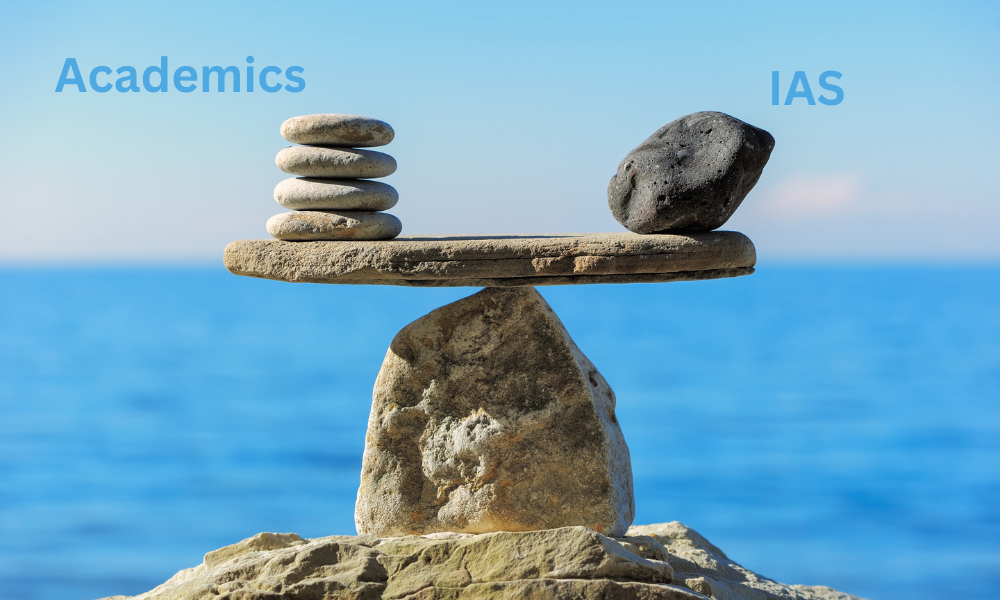Introduction
Have you ever wondered how students manage to excel in their college academics while also preparing for the civil services exam? Balancing both is not just possible—it’s smart planning. Imagine walking on a tightrope: one side is your degree and the other side is your dream of becoming an IAS officer. With balance, focus, and the right guidance, you can walk confidently toward success.
At Ignite IAS, we strongly believe that early and smart integration of academics with UPSC preparation can save precious years and help aspirants achieve their dreams faster. This article will guide you through practical ways to maintain balance and ensure success in both journeys.
1. Why Balancing Academics and IAS Preparation Matters
Many aspirants delay UPSC preparation until after graduation. But in reality, preparing alongside academics is a smart move. Your college degree ensures stability, while UPSC preparation shapes your future. Striking a balance allows you to stay academically strong while not losing valuable years for UPSC.
2. Understanding the Overlap Between Academics and UPSC Syllabus
If you look closely, many subjects in college overlap with the UPSC Prelims and Mains syllabus. For example:
- Political Science students benefit in Polity and Governance.
- Economics students naturally cover Indian Economy topics.
- History students have an advantage in General Studies.
This overlap means you’re not studying twice—you’re building on what you already learn.
3. Setting Clear Goals Early On
Without goals, it’s like sailing without a compass. You need to answer:
- Do I want to attempt UPSC right after graduation?
- How much daily time can I realistically give to UPSC prep without affecting grades?
Clear goals help you create a structured plan.
4. Time Management: The Key to Smart Balance
Time is the most valuable resource. Divide your day into 3 focused slots:
- Academics – Attend classes, take notes.
- UPSC Preparation – Daily current affairs, NCERTs, and practice.
- Revision & Rest – Consolidate learning and recharge.
Think of it as investing in two bank accounts daily—one for your degree and one for your IAS dream.
5. Making Use of College Resources
Your college library, research labs, and even professors can indirectly support UPSC prep. For example, professors in economics or history can help clarify UPSC-related doubts. Make the most of resources already available to you.
6. Prioritizing Subjects That Help in UPSC
Not all subjects carry equal weight. Focus extra effort on academic subjects that overlap with UPSC. This saves time and gives you dual benefits—better grades and stronger UPSC knowledge.
7. Smart Study Techniques to Save Time
- Pomodoro Technique: Study 25 minutes, break for 5 minutes.
- Mind Maps: Visualize topics instead of long notes.
- One-Page Summaries: Keep quick revision sheets.
These hacks ensure you don’t feel burdened by dual preparation.
8. Managing Stress While Handling Both
Stress is natural when juggling two big goals. Simple techniques like meditation, journaling, or even a short evening walk can refresh your mind. Remember, consistency matters more than overexertion.
9. The Role of Peer Groups and Mentors
Being around like-minded peers creates a positive learning ecosystem. A mentor or coaching institute like Ignite IAS helps you stay on track, gives guidance, and prevents mistakes.
10. Using Technology to Stay Organized
Use apps like:
- Evernote/Notion for digital notes.
- Google Calendar for scheduling.
- Daily current affairs apps for staying updated.
Technology can act like your personal assistant in managing academics and UPSC prep.
11. Avoiding Common Mistakes Students Make
- Ignoring academics while focusing only on UPSC.
- Depending too much on college syllabus without extra UPSC focus.
- Studying long hours without effective revision.
Avoiding these mistakes can save both time and effort.
12. How Ignite IAS Helps Students Balance Both
At Ignite IAS, we provide integrated coaching programs where students can manage their degree and UPSC preparation simultaneously. With expert mentors, structured timetables, and stress-free study environments, we ensure aspirants don’t compromise on either side.
13. Stories of Successful Students Who Did It
Several UPSC toppers started their preparation early during their graduation. Their secret? Balancing both worlds smartly. With consistency, they cracked the toughest exam without affecting academic success.
14. Building Consistency Over Intensity
Don’t aim for overnight results. Instead, small, consistent steps daily lead to long-term success. Think of it like watering a plant every day instead of flooding it once a month.
15. Final Thoughts: The Long-Term Payoff of Balance
Balancing academics and IAS preparation might feel tough at first, but it pays off immensely. By the time you graduate, you’ll be ready to attempt UPSC with confidence, while also having a strong academic foundation.
FAQs
1. Is it really possible to prepare for UPSC along with college academics?
Yes, with smart planning, you can balance both effectively without compromising either.
2. How many hours should I give daily for UPSC preparation while in college?
At least 2–3 focused hours daily, alongside your academics, is enough if done consistently.
3. Does starting UPSC prep during graduation give an advantage?
Yes, it saves years of trial and error, builds confidence, and ensures you’re ready for early attempts.
4. Can I use my academic subjects as an optional for UPSC?
Absolutely. Choosing your graduation subject as an optional saves time and strengthens your preparation.
5. How does Ignite IAS help students balance both?
Ignite IAS offers integrated coaching with structured timetables, mentoring, and support to ensure success in both academics and UPSC preparation.


